人教版2019年高中选修1 Unit 1 People of Achievement 单元知识总结清单(含练习题和书面表达句式及范文)
文档属性
| 名称 | 人教版2019年高中选修1 Unit 1 People of Achievement 单元知识总结清单(含练习题和书面表达句式及范文) |
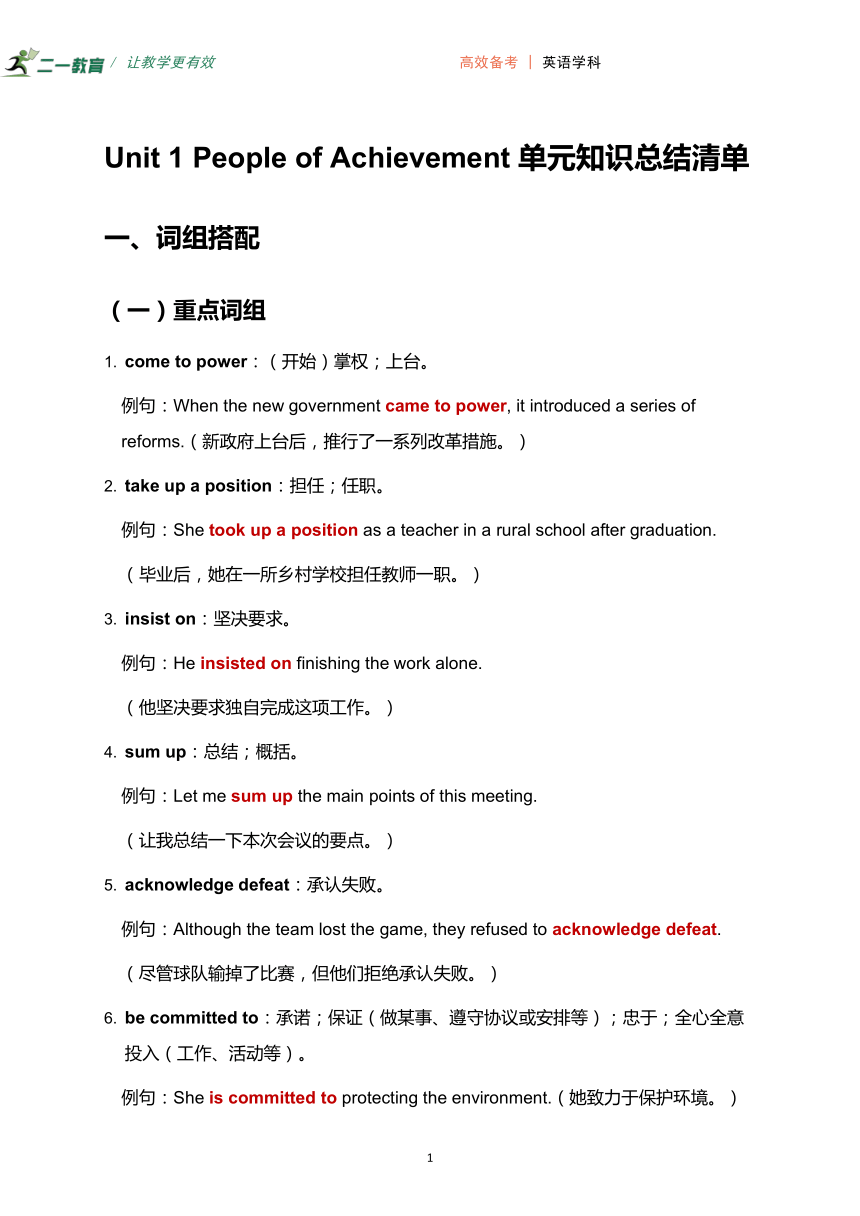
|
|
| 格式 | docx | ||
| 文件大小 | 47.4KB | ||
| 资源类型 | 试卷 | ||
| 版本资源 | 人教版(2019) | ||
| 科目 | 英语 | ||
| 更新时间 | 2025-07-13 11:06:23 | ||
图片预览

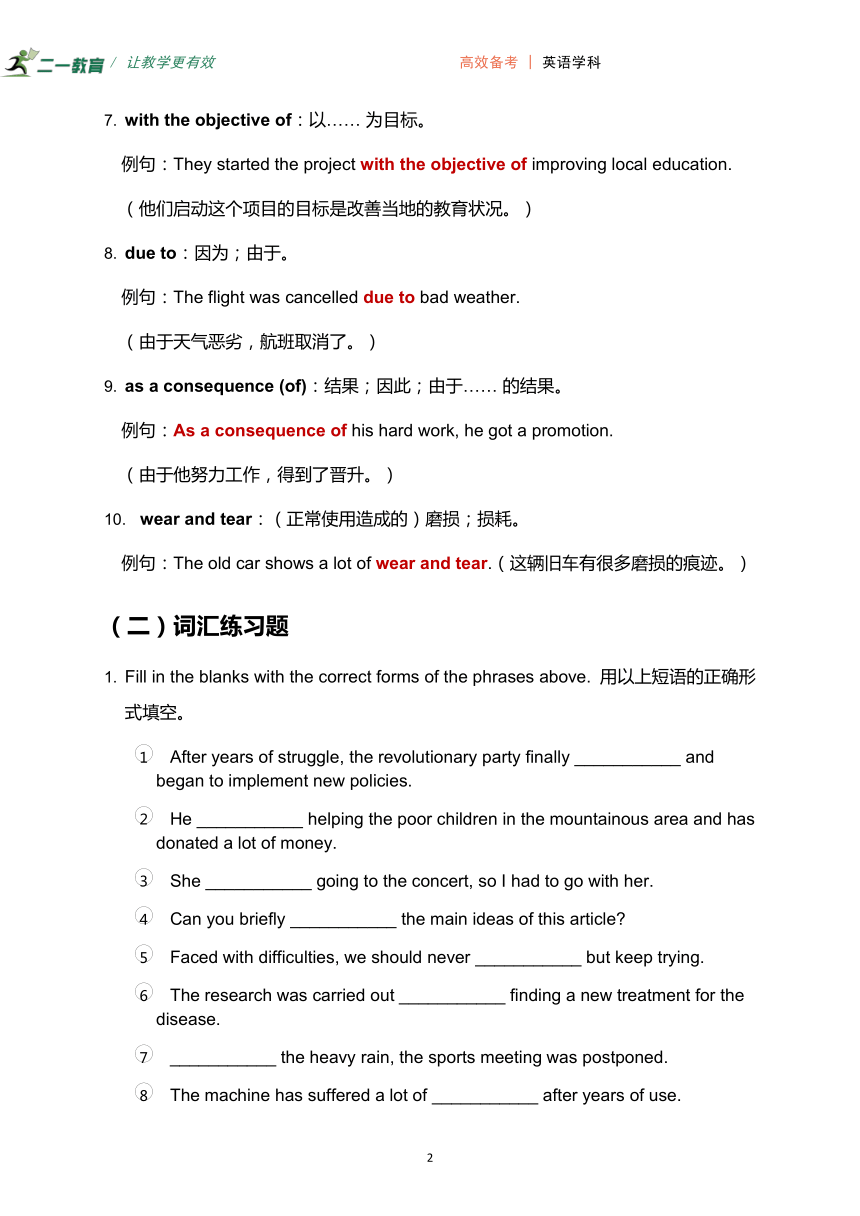
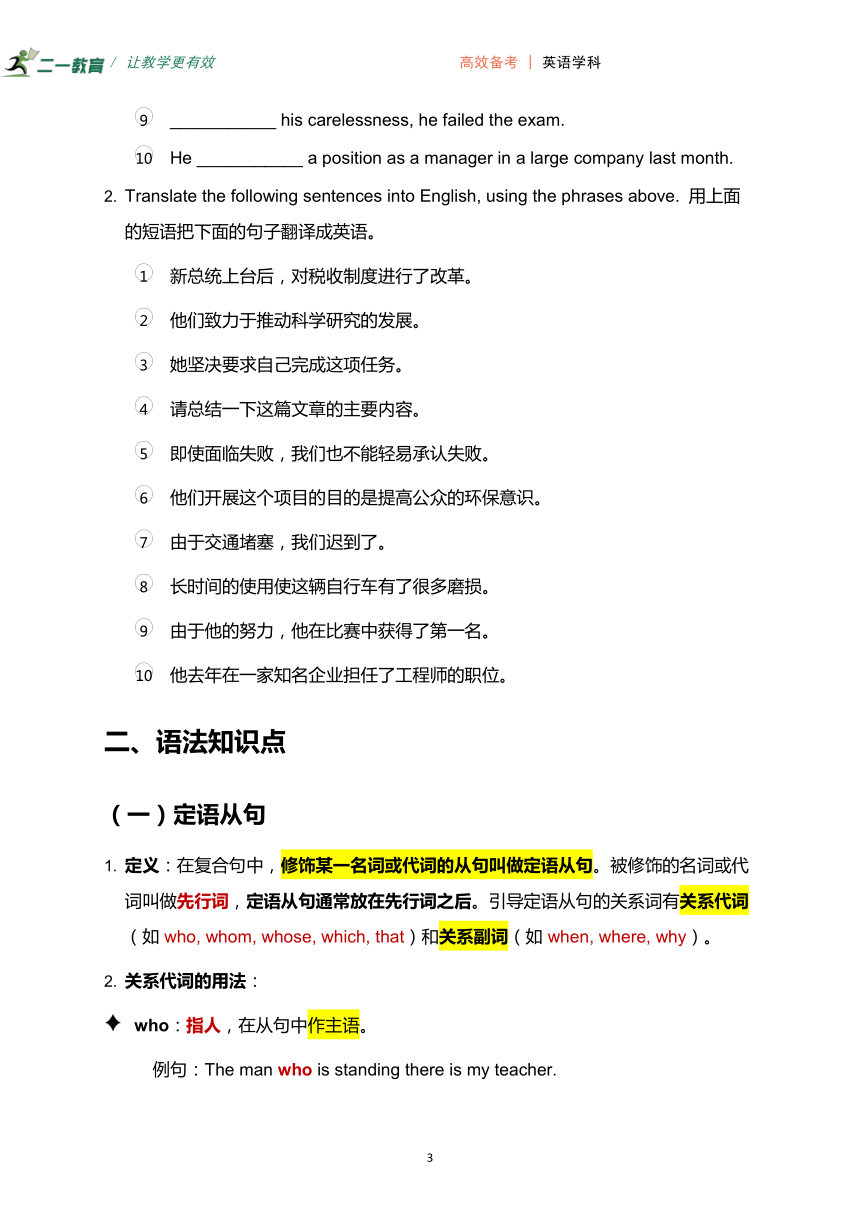
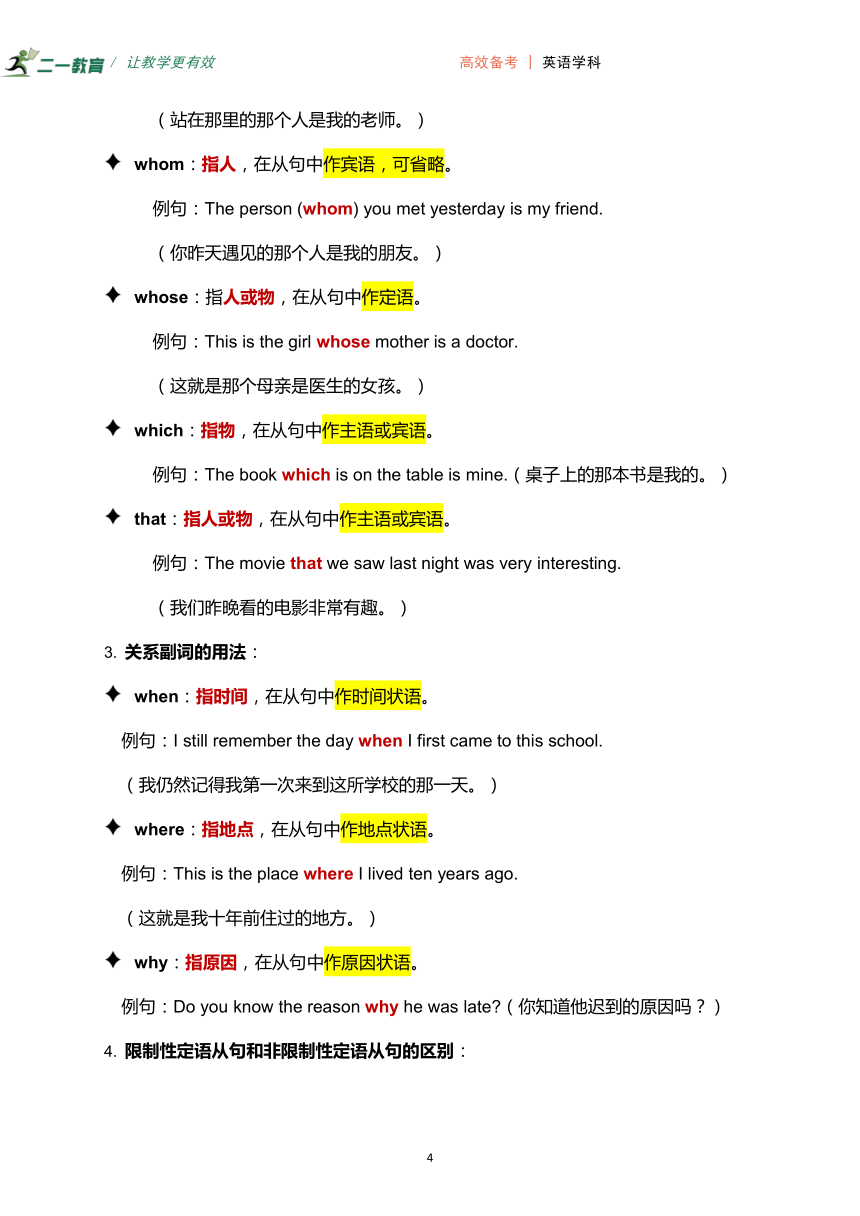
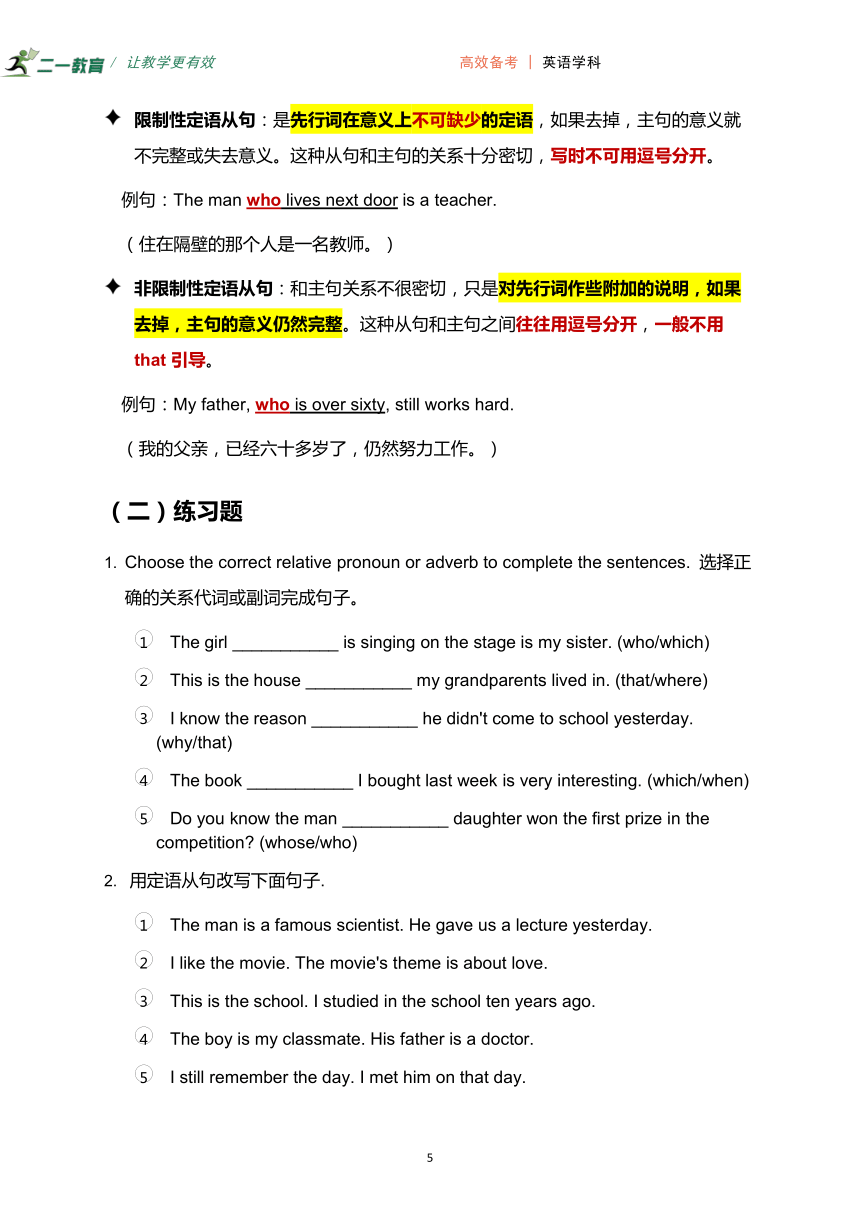
文档简介
/ 让教学更有效 高效备考 | 英语学科
Unit 1 People of Achievement 单元知识总结清单
一、词组搭配
(一)重点词组
come to power:(开始)掌权;上台。
例句:When the new government came to power, it introduced a series of reforms.(新政府上台后,推行了一系列改革措施。)
take up a position:担任;任职。
例句:She took up a position as a teacher in a rural school after graduation.
(毕业后,她在一所乡村学校担任教师一职。)
insist on:坚决要求。
例句:He insisted on finishing the work alone.
(他坚决要求独自完成这项工作。)
sum up:总结;概括。
例句:Let me sum up the main points of this meeting.
(让我总结一下本次会议的要点。)
acknowledge defeat:承认失败。
例句:Although the team lost the game, they refused to acknowledge defeat.
(尽管球队输掉了比赛,但他们拒绝承认失败。)
be committed to:承诺;保证(做某事、遵守协议或安排等);忠于;全心全意投入(工作、活动等)。
例句:She is committed to protecting the environment.(她致力于保护环境。)
with the objective of:以…… 为目标。
例句:They started the project with the objective of improving local education.
(他们启动这个项目的目标是改善当地的教育状况。)
due to:因为;由于。
例句:The flight was cancelled due to bad weather.
(由于天气恶劣,航班取消了。)
as a consequence (of):结果;因此;由于…… 的结果。
例句:As a consequence of his hard work, he got a promotion.
(由于他努力工作,得到了晋升。)
wear and tear:(正常使用造成的)磨损;损耗。
例句:The old car shows a lot of wear and tear.(这辆旧车有很多磨损的痕迹。)
(二)词汇练习题
Fill in the blanks with the correct forms of the phrases above.
用以上短语的正确形式填空。
After years of struggle, the revolutionary party finally ___________ and began to implement new policies.
He ___________ helping the poor children in the mountainous area and has donated a lot of money.
She ___________ going to the concert, so I had to go with her.
Can you briefly ___________ the main ideas of this article
Faced with difficulties, we should never ___________ but keep trying.
The research was carried out ___________ finding a new treatment for the disease.
___________ the heavy rain, the sports meeting was postponed.
The machine has suffered a lot of ___________ after years of use.
___________ his carelessness, he failed the exam.
He ___________ a position as a manager in a large company last month.
Translate the following sentences into English, using the phrases above.
用上面的短语把下面的句子翻译成英语。
新总统上台后,对税收制度进行了改革。
他们致力于推动科学研究的发展。
她坚决要求自己完成这项任务。
请总结一下这篇文章的主要内容。
即使面临失败,我们也不能轻易承认失败。
他们开展这个项目的目的是提高公众的环保意识。
由于交通堵塞,我们迟到了。
长时间的使用使这辆自行车有了很多磨损。
由于他的努力,他在比赛中获得了第一名。
他去年在一家知名企业担任了工程师的职位。
二、语法知识点
(一)定语从句
定义:在复合句中,修饰某一名词或代词的从句叫做定语从句。被修饰的名词或代词叫做先行词,定语从句通常放在先行词之后。引导定语从句的关系词有关系代词(如 who, whom, whose, which, that)和关系副词(如 when, where, why)。
关系代词的用法:
who:指人,在从句中作主语。
例句:The man who is standing there is my teacher.
(站在那里的那个人是我的老师。)
whom:指人,在从句中作宾语,可省略。
例句:The person (whom) you met yesterday is my friend.
(你昨天遇见的那个人是我的朋友。)
whose:指人或物,在从句中作定语。
例句:This is the girl whose mother is a doctor.
(这就是那个母亲是医生的女孩。)
which:指物,在从句中作主语或宾语。
例句:The book which is on the table is mine.(桌子上的那本书是我的。)
that:指人或物,在从句中作主语或宾语。
例句:The movie that we saw last night was very interesting.
(我们昨晚看的电影非常有趣。)
关系副词的用法:
when:指时间,在从句中作时间状语。
例句:I still remember the day when I first came to this school.
(我仍然记得我第一次来到这所学校的那一天。)
where:指地点,在从句中作地点状语。
例句:This is the place where I lived ten years ago.
(这就是我十年前住过的地方。)
why:指原因,在从句中作原因状语。
例句:Do you know the reason why he was late (你知道他迟到的原因吗?)
限制性定语从句和非限制性定语从句的区别:
限制性定语从句:是先行词在意义上不可缺少的定语,如果去掉,主句的意义就不完整或失去意义。这种从句和主句的关系十分密切,写时不可用逗号分开。
例句:The man who lives next door is a teacher.
(住在隔壁的那个人是一名教师。)
非限制性定语从句:和主句关系不很密切,只是对先行词作些附加的说明,如果去掉,主句的意义仍然完整。这种从句和主句之间往往用逗号分开,一般不用 that 引导。
例句:My father, who is over sixty, still works hard.
(我的父亲,已经六十多岁了,仍然努力工作。)
(二)练习题
Choose the correct relative pronoun or adverb to complete the sentences.
选择正确的关系代词或副词完成句子。
The girl ___________ is singing on the stage is my sister. (who/which)
This is the house ___________ my grandparents lived in. (that/where)
I know the reason ___________ he didn't come to school yesterday. (why/that)
The book ___________ I bought last week is very interesting. (which/when)
Do you know the man ___________ daughter won the first prize in the competition (whose/who)
用定语从句改写下面句子.
The man is a famous scientist. He gave us a lecture yesterday.
I like the movie. The movie's theme is about love.
This is the school. I studied in the school ten years ago.
The boy is my classmate. His father is a doctor.
I still remember the day. I met him on that day.
Correct the mistakes in the following sentences.
纠正下列句子中的错误。
The book which I borrowed it from the library is very useful.
The man who he is talking with is my teacher.
This is the place where we visited last year.
I don't know the reason which he was late.
The girl whose her name is Lucy is my best friend.
三、重要句式句型分析
(一)This year’s Nobel Prize for Physiology or Medicine has been awarded to Tu Youyou (co-winner), whose research led to the discovery of artemisinin, a crucial new treatment for malaria.
结构分析:句子主干为 “This year’s Nobel Prize for Physiology or Medicine has been awarded to Tu Youyou (co-winner)”,使用了现在完成时的被动语态;“whose research led to the discovery of artemisinin, a crucial new treatment for malaria” 是 whose 引导的非限制性定语从句,修饰先行词 Tu Youyou,其中 “a crucial new treatment for malaria” 是 artemisinin 的同位语,对其进行解释说明。
(二)Tu Youyou, a committed and patient scientist, was born in Ningbo, China, on 30 December 1930, and graduated from Peking University Medical School in 1955.
结构分析:“Tu Youyou” 是句子主语,“a committed and patient scientist” 是同位语,对 Tu Youyou 进行补充说明;“was born in Ningbo, China, on 30 December 1930” 和 “graduated from Peking University Medical School in 1955” 是两个并列的谓语部分,分别介绍她的出生信息和教育背景。
(三)翻译练习题
今年的文学奖授予了那位著名作家,他的作品深受读者喜爱。
爱因斯坦,一位极具天赋且富有创造力的科学家,提出了相对论。
这位医生,一位敬业且善良的人,在医院工作了三十年,拯救了无数生命。
四、单元书面表达写作指导
(一)重要词汇词组搭配积累
人物品质描述类词汇:committed(尽心尽力的),patient(有耐心的),brave(勇敢的),kind(善良的),intelligent(聪明的),hardworking(勤奋的),determined(坚定的),selfless(无私的)
成就相关词汇:make contributions to(为…… 做出贡献),lead to(导致;通向),result in(导致),achieve success(取得成功),gain recognition(获得认可),win an award(获奖)
事件描述类词汇:carry out research(进行研究),graduate from(毕业于),take up a position(担任职位),come to power(掌权),face difficulties(面临困难)
(二)高分句式积累
定语从句:The person who/that... is...(…… 的人是……);
This is the... which/that...(这就是那个…… 的……)
强调句:It is/was... that/who...(正是……)。
例句:It was his hard work that led to his success.
(正是他的努力工作导致了他的成功。)
倒装句:Only in this way can we...(只有这样我们才能……)。
例句:Only in this way can we achieve our goals.
(只有这样我们才能实现我们的目标。)
非谓语动词作状语:Having done...,...(做完…… 之后,……)。
例句:Having finished his homework, he went out to play.
(做完作业后,他出去玩了。)
(三)参考范文
The Person I Admire Most
The person I admire most is Yuan Longping, a great scientist who made significant contributions to China’s agriculture.
Yuan Longping, known as the “Father of Hybrid Rice,” was born in 1930. With the objective of solving the problem of hunger, he devoted his whole life to the research and development of hybrid rice. After years of hard work and countless experiments, he finally succeeded in developing a high-yield hybrid rice variety. His achievement not only greatly increased China’s rice production but also helped to feed millions of people around the world.
What makes him so admirable is his unwavering determination and selfless dedication. Despite facing many difficulties and setbacks during his research, he never gave up. He insisted on working in the fields, closely observing the growth of rice plants and constantly improving his research methods. He was committed to sharing his technology and experience with other countries, making important contributions to global food security.
Yuan Longping is not only a great scientist but also a kind and humble person. He always cared about the well-being of farmers and was willing to help them improve their planting techniques. His spirit of perseverance and selfless dedication has inspired countless people, including me. I hope that one day I can also make my own contribution to society, just like him.
练习题答案及解析
一、词组搭配练习题答案及解析
(一)Fill in the blanks with the correct forms of the phrases above
答案:came to power
解析:“After years of struggle, the revolutionary party finally... and began to implement new policies.”,句子表达革命党经过多年斗争后开始掌权并推行新政策,“come to power” 表示 “(开始)掌权;上台”,结合语境,句子时态为一般过去时,所以填 “came to power”。
答案:is committed to
解析:“He... helping the poor children in the mountainous area and has donated a lot of money.”,此句表示他致力于帮助山区贫困儿童且捐了很多钱,“be committed to” 表示 “承诺;保证(做某事、遵守协议或安排等);忠于;全心全意投入(工作、活动等)”,to 为介词,后接动名词,句子时态为一般现在时,主语 He 是第三人称单数,be 动词用 is,所以填 “is committed to”。
答案:insisted on
解析:“She... going to the concert, so I had to go with her.”,句子意思是她坚决要求去听音乐会,所以 “我” 不得不陪她去,“insist on” 表示 “坚决要求”,on 为介词,后接动名词,句子时态为一般过去时,所以填 “insisted on”。
答案:sum up
解析:“Can you briefly... the main ideas of this article ”,询问能否简要总结文章的主要观点,“sum up” 表示 “总结;概括”,“Can you” 后接动词原形,所以填 “sum up”。
答案:acknowledge defeat
解析:“Faced with difficulties, we should never... but keep trying.”,表达面对困难不应承认失败而要继续尝试,“acknowledge defeat” 表示 “承认失败”,“should never” 后接动词原形,所以填 “acknowledge defeat”。
答案:with the objective of
解析:“The research was carried out... finding a new treatment for the disease.”,说明开展研究的目标是找到治疗疾病的新方法,“with the objective of” 表示 “以…… 为目标”,of 为介词,后接动名词,所以填 “with the objective of”。
答案:Due to
解析:“... the heavy rain, the sports meeting was postponed.”,表示因为大雨运动会被推迟,“due to” 表示 “因为;由于”,后接名词短语,位于句首,首字母大写,所以填 “Due to”。
答案:wear and tear
解析:“The machine has suffered a lot of... after years of use.”,描述机器经过多年使用有很多磨损,“wear and tear” 表示 “(正常使用造成的)磨损;损耗”,符合语境,所以填 “wear and tear”。
答案:As a consequence of
解析:“... his carelessness, he failed the exam.”,意思是由于他的粗心,他考试不及格,“as a consequence of” 表示 “由于…… 的结果”,后接名词短语,位于句首,首字母大写,所以填 “As a consequence of”。
答案:took up
解析:“He... a position as a manager in a large company last month.”,表示他上个月在一家大公司担任经理职位,“take up a position” 表示 “担任;任职”,句子时态为一般过去时,所以填 “took up”。
(二)Translate the following sentences into English, using the phrases above
答案:After the new president came to power, he reformed the tax system.
解析:“新总统上台后” 翻译为 “After the new president came to power”,“came to power” 表示 “上台”;“对税收制度进行了改革” 翻译为 “he reformed the tax system”,使用一般过去时与前文时态一致。
答案:They are committed to promoting the development of scientific research.
解析:“他们致力于” 翻译为 “They are committed to”,“be committed to” 后接动名词;“推动科学研究的发展” 翻译为 “promoting the development of scientific research”,“promote” 表示 “推动”,“the development of...” 表示 “…… 的发展”。
答案:She insisted on finishing the task by herself.
解析:“她坚决要求” 翻译为 “She insisted on”,“insist on” 后接动名词;“自己完成这项任务” 翻译为 “finishing the task by herself”,“by oneself” 表示 “独自”。
答案:Please sum up the main content of this article.
解析:“请总结一下” 翻译为 “Please sum up”;“这篇文章的主要内容” 翻译为 “the main content of this article”,“sum up” 表示 “总结”,“the content of...” 表示 “…… 的内容”。
答案:Even in the face of failure, we should not easily acknowledge defeat.
解析:“即使面临失败” 翻译为 “Even in the face of failure”;“我们也不能轻易承认失败” 翻译为 “we should not easily acknowledge defeat”,“acknowledge defeat” 表示 “承认失败”。
答案:They launched this project with the objective of raising public awareness of environmental protection.
解析:“他们开展这个项目” 翻译为 “They launched this project”;“目的是” 翻译为 “with the objective of”,后接动名词;“提高公众的环保意识” 翻译为 “raising public awareness of environmental protection”,“raise awareness of...” 表示 “提高…… 的意识”。
答案:We were late due to the traffic jam.
解析:“我们迟到了” 翻译为 “We were late”;“由于交通堵塞” 翻译为 “due to the traffic jam”,“due to” 后接名词短语表示原因。
答案:Long - term use has caused a lot of wear and tear on this bicycle.
解析:“长时间的使用” 翻译为 “Long - term use”;“使…… 有了很多磨损” 翻译为 “has caused a lot of wear and tear on...”,“wear and tear” 表示 “磨损”;“这辆自行车” 翻译为 “this bicycle”。
答案:As a consequence of his efforts, he won the first prize in the competition.
解析:“由于他的努力” 翻译为 “As a consequence of his efforts”;“他在比赛中获得了第一名” 翻译为 “he won the first prize in the competition”,使用一般过去时,“win the first prize” 表示 “获得第一名”。
答案:He took up a position as an engineer in a well - known enterprise last year.
解析:“他去年” 翻译为 “He last year”;“在一家知名企业担任了工程师的职位” 翻译为 “took up a position as an engineer in a well - known enterprise”,“take up a position as...” 表示 “担任…… 职位” 。
二、语法知识点练习题答案及解析
(一)Choose the correct relative pronoun or adverb to complete the sentences
答案:who
解析:“The girl... is singing on the stage is my sister.”,先行词是 “The girl”,指人,关系词在从句中作主语,所以用关系代词 who。
答案:that
解析:“This is the house... my grandparents lived in.”,先行词是 “the house”,指物,关系词在从句中作 “lived in” 的宾语,可用 which 或 that,所以填 that。
答案:why
解析:“I know the reason... he didn't come to school yesterday.”,先行词是 “the reason”,表示原因,关系词在从句中作原因状语,所以用关系副词 why。
答案:which
解析:“The book... I bought last week is very interesting.”,先行词是 “the book”,指物,关系词在从句中作 “bought” 的宾语,所以用关系代词 which。
答案:whose
解析:“Do you know the man... daughter won the first prize in the competition ”,先行词是 “the man”,关系词在从句中作 “daughter” 的定语,表示 “某人的”,所以用关系代词 whose。
(二)Rewrite the following sentences using 定语从句
答案:The man who gave us a lecture yesterday is a famous scientist.
解析:先行词是 “The man”,指人,在从句中作主语,用关系代词 who 引导定语从句 “who gave us a lecture yesterday”,修饰先行词 “The man” 。
答案:I like the movie whose theme is about love.
解析:先行词是 “the movie”,关系词在从句中作 “theme” 的定语,表示 “电影的”,用关系代词 whose 引导定语从句 “whose theme is about love”,修饰先行词 “the movie” 。
答案:This is the school where I studied ten years ago.
解析:先行词是 “the school”,表示地点,关系词在从句中作地点状语,用关系副词 where 引导定语从句 “where I studied ten years ago”,修饰先行词 “the school” 。
答案:The boy whose father is a doctor is my classmate.
解析:先行词是 “The boy”,关系词在从句中作 “father” 的定语,表示 “男孩的”,用关系代词 whose 引导定语从句 “whose father is a doctor”,修饰先行词 “The boy” 。
答案:I still remember the day when I met him.
解析:先行词是 “the day”,表示时间,关系词在从句中作时间状语,用关系副词 when 引导定语从句 “when I met him”,修饰先行词 “the day” 。
(三)Correct the mistakes in the following sentences
答案:The book which I borrowed from the library is very useful.
解析:原句 “The book which I borrowed it from the library is very useful.” 中,“which” 引导定语从句,在从句中作 “borrowed” 的宾语,“it” 多余,应删去。
答案:The man who is talking with me is my teacher.
解析:原句 “The man who he is talking with is my teacher.” 中,“who” 引导定语从句,在从句中作主语,“he” 多余,应删去。
答案:This is the place that/which we visited last year.
解析:原句 “This is the place where we visited last year.” 中,先行词 “the place” 在从句 “we visited last year” 中作 “visited” 的宾语,关系词应用 that 或 which,而 where 是关系副词,在从句中作地点状语,所以应把 where 改为 that 或 which。
答案:I don't know the reason why he was late.
解析:原句 “I don't know the reason which he was late.” 中,先行词 “the reason” 在从句 “he was late” 中作原因状语,关系词应用 why,而 which 在从句中作主语或宾语,所以应把 which 改为 why。
答案:The girl whose name is Lucy is my best friend.
解析:原句 “The girl whose her name is Lucy is my best friend.” 中,“whose” 表示 “某人的”,已经包含 “她的” 的意思,“her” 多余,应删去。
三、重要句式句型分析翻译练习题答案及解析
答案:This year’s Literature Prize has been awarded to that famous writer, whose works are deeply loved by readers.
解析:参照 “This year’s Nobel Prize for Physiology or Medicine has been awarded to Tu Youyou (co-winner), whose research led to the discovery of artemisinin, a crucial new treatment for malaria.” 的结构,“今年的文学奖授予了” 翻译为 “This year’s Literature Prize has been awarded to”,使用现在完成时的被动语态;“那位著名作家” 翻译为 “that famous writer”;“他的作品深受读者喜爱” 翻译为 “whose works are deeply loved by readers”,用 whose 引导非限制性定语从句修饰先行词 “writer”,“works” 表示 “作品” 。
答案:Einstein, a highly talented and creative scientist, put forward the theory of relativity.
解析:参考 “Tu Youyou, a committed and patient scientist, was born in Ningbo, China, on 30 December 1930, and graduated from Peking University Medical School in 1955.” 的结构,“爱因斯坦” 翻译为 “Einstein”;“一位极具天赋且富有创造力的科学家” 翻译为 “a highly talented and creative scientist”,作同位语;“提出了相对论” 翻译为 “put forward the theory of relativity”,“put forward” 表示 “提出” 。
答案:This doctor, a dedicated and kind - hearted person, has worked in the hospital for thirty years and saved countless lives.
解析:同样参考上述结构,“这位医生” 翻译为 “This doctor”;“一位敬业且善良的人” 翻译为 “a dedicated and kind - hearted person”,作同位语;“在医院工作了三十年,拯救了无数生命” 翻译为 “has worked in the hospital for thirty years and saved countless lives”,使用现在完成时表示从过去持续到现在的动作和结果 。
Unit 1 People of Achievement 单元知识总结清单
一、词组搭配
(一)重点词组
come to power:(开始)掌权;上台。
例句:When the new government came to power, it introduced a series of reforms.(新政府上台后,推行了一系列改革措施。)
take up a position:担任;任职。
例句:She took up a position as a teacher in a rural school after graduation.
(毕业后,她在一所乡村学校担任教师一职。)
insist on:坚决要求。
例句:He insisted on finishing the work alone.
(他坚决要求独自完成这项工作。)
sum up:总结;概括。
例句:Let me sum up the main points of this meeting.
(让我总结一下本次会议的要点。)
acknowledge defeat:承认失败。
例句:Although the team lost the game, they refused to acknowledge defeat.
(尽管球队输掉了比赛,但他们拒绝承认失败。)
be committed to:承诺;保证(做某事、遵守协议或安排等);忠于;全心全意投入(工作、活动等)。
例句:She is committed to protecting the environment.(她致力于保护环境。)
with the objective of:以…… 为目标。
例句:They started the project with the objective of improving local education.
(他们启动这个项目的目标是改善当地的教育状况。)
due to:因为;由于。
例句:The flight was cancelled due to bad weather.
(由于天气恶劣,航班取消了。)
as a consequence (of):结果;因此;由于…… 的结果。
例句:As a consequence of his hard work, he got a promotion.
(由于他努力工作,得到了晋升。)
wear and tear:(正常使用造成的)磨损;损耗。
例句:The old car shows a lot of wear and tear.(这辆旧车有很多磨损的痕迹。)
(二)词汇练习题
Fill in the blanks with the correct forms of the phrases above.
用以上短语的正确形式填空。
After years of struggle, the revolutionary party finally ___________ and began to implement new policies.
He ___________ helping the poor children in the mountainous area and has donated a lot of money.
She ___________ going to the concert, so I had to go with her.
Can you briefly ___________ the main ideas of this article
Faced with difficulties, we should never ___________ but keep trying.
The research was carried out ___________ finding a new treatment for the disease.
___________ the heavy rain, the sports meeting was postponed.
The machine has suffered a lot of ___________ after years of use.
___________ his carelessness, he failed the exam.
He ___________ a position as a manager in a large company last month.
Translate the following sentences into English, using the phrases above.
用上面的短语把下面的句子翻译成英语。
新总统上台后,对税收制度进行了改革。
他们致力于推动科学研究的发展。
她坚决要求自己完成这项任务。
请总结一下这篇文章的主要内容。
即使面临失败,我们也不能轻易承认失败。
他们开展这个项目的目的是提高公众的环保意识。
由于交通堵塞,我们迟到了。
长时间的使用使这辆自行车有了很多磨损。
由于他的努力,他在比赛中获得了第一名。
他去年在一家知名企业担任了工程师的职位。
二、语法知识点
(一)定语从句
定义:在复合句中,修饰某一名词或代词的从句叫做定语从句。被修饰的名词或代词叫做先行词,定语从句通常放在先行词之后。引导定语从句的关系词有关系代词(如 who, whom, whose, which, that)和关系副词(如 when, where, why)。
关系代词的用法:
who:指人,在从句中作主语。
例句:The man who is standing there is my teacher.
(站在那里的那个人是我的老师。)
whom:指人,在从句中作宾语,可省略。
例句:The person (whom) you met yesterday is my friend.
(你昨天遇见的那个人是我的朋友。)
whose:指人或物,在从句中作定语。
例句:This is the girl whose mother is a doctor.
(这就是那个母亲是医生的女孩。)
which:指物,在从句中作主语或宾语。
例句:The book which is on the table is mine.(桌子上的那本书是我的。)
that:指人或物,在从句中作主语或宾语。
例句:The movie that we saw last night was very interesting.
(我们昨晚看的电影非常有趣。)
关系副词的用法:
when:指时间,在从句中作时间状语。
例句:I still remember the day when I first came to this school.
(我仍然记得我第一次来到这所学校的那一天。)
where:指地点,在从句中作地点状语。
例句:This is the place where I lived ten years ago.
(这就是我十年前住过的地方。)
why:指原因,在从句中作原因状语。
例句:Do you know the reason why he was late (你知道他迟到的原因吗?)
限制性定语从句和非限制性定语从句的区别:
限制性定语从句:是先行词在意义上不可缺少的定语,如果去掉,主句的意义就不完整或失去意义。这种从句和主句的关系十分密切,写时不可用逗号分开。
例句:The man who lives next door is a teacher.
(住在隔壁的那个人是一名教师。)
非限制性定语从句:和主句关系不很密切,只是对先行词作些附加的说明,如果去掉,主句的意义仍然完整。这种从句和主句之间往往用逗号分开,一般不用 that 引导。
例句:My father, who is over sixty, still works hard.
(我的父亲,已经六十多岁了,仍然努力工作。)
(二)练习题
Choose the correct relative pronoun or adverb to complete the sentences.
选择正确的关系代词或副词完成句子。
The girl ___________ is singing on the stage is my sister. (who/which)
This is the house ___________ my grandparents lived in. (that/where)
I know the reason ___________ he didn't come to school yesterday. (why/that)
The book ___________ I bought last week is very interesting. (which/when)
Do you know the man ___________ daughter won the first prize in the competition (whose/who)
用定语从句改写下面句子.
The man is a famous scientist. He gave us a lecture yesterday.
I like the movie. The movie's theme is about love.
This is the school. I studied in the school ten years ago.
The boy is my classmate. His father is a doctor.
I still remember the day. I met him on that day.
Correct the mistakes in the following sentences.
纠正下列句子中的错误。
The book which I borrowed it from the library is very useful.
The man who he is talking with is my teacher.
This is the place where we visited last year.
I don't know the reason which he was late.
The girl whose her name is Lucy is my best friend.
三、重要句式句型分析
(一)This year’s Nobel Prize for Physiology or Medicine has been awarded to Tu Youyou (co-winner), whose research led to the discovery of artemisinin, a crucial new treatment for malaria.
结构分析:句子主干为 “This year’s Nobel Prize for Physiology or Medicine has been awarded to Tu Youyou (co-winner)”,使用了现在完成时的被动语态;“whose research led to the discovery of artemisinin, a crucial new treatment for malaria” 是 whose 引导的非限制性定语从句,修饰先行词 Tu Youyou,其中 “a crucial new treatment for malaria” 是 artemisinin 的同位语,对其进行解释说明。
(二)Tu Youyou, a committed and patient scientist, was born in Ningbo, China, on 30 December 1930, and graduated from Peking University Medical School in 1955.
结构分析:“Tu Youyou” 是句子主语,“a committed and patient scientist” 是同位语,对 Tu Youyou 进行补充说明;“was born in Ningbo, China, on 30 December 1930” 和 “graduated from Peking University Medical School in 1955” 是两个并列的谓语部分,分别介绍她的出生信息和教育背景。
(三)翻译练习题
今年的文学奖授予了那位著名作家,他的作品深受读者喜爱。
爱因斯坦,一位极具天赋且富有创造力的科学家,提出了相对论。
这位医生,一位敬业且善良的人,在医院工作了三十年,拯救了无数生命。
四、单元书面表达写作指导
(一)重要词汇词组搭配积累
人物品质描述类词汇:committed(尽心尽力的),patient(有耐心的),brave(勇敢的),kind(善良的),intelligent(聪明的),hardworking(勤奋的),determined(坚定的),selfless(无私的)
成就相关词汇:make contributions to(为…… 做出贡献),lead to(导致;通向),result in(导致),achieve success(取得成功),gain recognition(获得认可),win an award(获奖)
事件描述类词汇:carry out research(进行研究),graduate from(毕业于),take up a position(担任职位),come to power(掌权),face difficulties(面临困难)
(二)高分句式积累
定语从句:The person who/that... is...(…… 的人是……);
This is the... which/that...(这就是那个…… 的……)
强调句:It is/was... that/who...(正是……)。
例句:It was his hard work that led to his success.
(正是他的努力工作导致了他的成功。)
倒装句:Only in this way can we...(只有这样我们才能……)。
例句:Only in this way can we achieve our goals.
(只有这样我们才能实现我们的目标。)
非谓语动词作状语:Having done...,...(做完…… 之后,……)。
例句:Having finished his homework, he went out to play.
(做完作业后,他出去玩了。)
(三)参考范文
The Person I Admire Most
The person I admire most is Yuan Longping, a great scientist who made significant contributions to China’s agriculture.
Yuan Longping, known as the “Father of Hybrid Rice,” was born in 1930. With the objective of solving the problem of hunger, he devoted his whole life to the research and development of hybrid rice. After years of hard work and countless experiments, he finally succeeded in developing a high-yield hybrid rice variety. His achievement not only greatly increased China’s rice production but also helped to feed millions of people around the world.
What makes him so admirable is his unwavering determination and selfless dedication. Despite facing many difficulties and setbacks during his research, he never gave up. He insisted on working in the fields, closely observing the growth of rice plants and constantly improving his research methods. He was committed to sharing his technology and experience with other countries, making important contributions to global food security.
Yuan Longping is not only a great scientist but also a kind and humble person. He always cared about the well-being of farmers and was willing to help them improve their planting techniques. His spirit of perseverance and selfless dedication has inspired countless people, including me. I hope that one day I can also make my own contribution to society, just like him.
练习题答案及解析
一、词组搭配练习题答案及解析
(一)Fill in the blanks with the correct forms of the phrases above
答案:came to power
解析:“After years of struggle, the revolutionary party finally... and began to implement new policies.”,句子表达革命党经过多年斗争后开始掌权并推行新政策,“come to power” 表示 “(开始)掌权;上台”,结合语境,句子时态为一般过去时,所以填 “came to power”。
答案:is committed to
解析:“He... helping the poor children in the mountainous area and has donated a lot of money.”,此句表示他致力于帮助山区贫困儿童且捐了很多钱,“be committed to” 表示 “承诺;保证(做某事、遵守协议或安排等);忠于;全心全意投入(工作、活动等)”,to 为介词,后接动名词,句子时态为一般现在时,主语 He 是第三人称单数,be 动词用 is,所以填 “is committed to”。
答案:insisted on
解析:“She... going to the concert, so I had to go with her.”,句子意思是她坚决要求去听音乐会,所以 “我” 不得不陪她去,“insist on” 表示 “坚决要求”,on 为介词,后接动名词,句子时态为一般过去时,所以填 “insisted on”。
答案:sum up
解析:“Can you briefly... the main ideas of this article ”,询问能否简要总结文章的主要观点,“sum up” 表示 “总结;概括”,“Can you” 后接动词原形,所以填 “sum up”。
答案:acknowledge defeat
解析:“Faced with difficulties, we should never... but keep trying.”,表达面对困难不应承认失败而要继续尝试,“acknowledge defeat” 表示 “承认失败”,“should never” 后接动词原形,所以填 “acknowledge defeat”。
答案:with the objective of
解析:“The research was carried out... finding a new treatment for the disease.”,说明开展研究的目标是找到治疗疾病的新方法,“with the objective of” 表示 “以…… 为目标”,of 为介词,后接动名词,所以填 “with the objective of”。
答案:Due to
解析:“... the heavy rain, the sports meeting was postponed.”,表示因为大雨运动会被推迟,“due to” 表示 “因为;由于”,后接名词短语,位于句首,首字母大写,所以填 “Due to”。
答案:wear and tear
解析:“The machine has suffered a lot of... after years of use.”,描述机器经过多年使用有很多磨损,“wear and tear” 表示 “(正常使用造成的)磨损;损耗”,符合语境,所以填 “wear and tear”。
答案:As a consequence of
解析:“... his carelessness, he failed the exam.”,意思是由于他的粗心,他考试不及格,“as a consequence of” 表示 “由于…… 的结果”,后接名词短语,位于句首,首字母大写,所以填 “As a consequence of”。
答案:took up
解析:“He... a position as a manager in a large company last month.”,表示他上个月在一家大公司担任经理职位,“take up a position” 表示 “担任;任职”,句子时态为一般过去时,所以填 “took up”。
(二)Translate the following sentences into English, using the phrases above
答案:After the new president came to power, he reformed the tax system.
解析:“新总统上台后” 翻译为 “After the new president came to power”,“came to power” 表示 “上台”;“对税收制度进行了改革” 翻译为 “he reformed the tax system”,使用一般过去时与前文时态一致。
答案:They are committed to promoting the development of scientific research.
解析:“他们致力于” 翻译为 “They are committed to”,“be committed to” 后接动名词;“推动科学研究的发展” 翻译为 “promoting the development of scientific research”,“promote” 表示 “推动”,“the development of...” 表示 “…… 的发展”。
答案:She insisted on finishing the task by herself.
解析:“她坚决要求” 翻译为 “She insisted on”,“insist on” 后接动名词;“自己完成这项任务” 翻译为 “finishing the task by herself”,“by oneself” 表示 “独自”。
答案:Please sum up the main content of this article.
解析:“请总结一下” 翻译为 “Please sum up”;“这篇文章的主要内容” 翻译为 “the main content of this article”,“sum up” 表示 “总结”,“the content of...” 表示 “…… 的内容”。
答案:Even in the face of failure, we should not easily acknowledge defeat.
解析:“即使面临失败” 翻译为 “Even in the face of failure”;“我们也不能轻易承认失败” 翻译为 “we should not easily acknowledge defeat”,“acknowledge defeat” 表示 “承认失败”。
答案:They launched this project with the objective of raising public awareness of environmental protection.
解析:“他们开展这个项目” 翻译为 “They launched this project”;“目的是” 翻译为 “with the objective of”,后接动名词;“提高公众的环保意识” 翻译为 “raising public awareness of environmental protection”,“raise awareness of...” 表示 “提高…… 的意识”。
答案:We were late due to the traffic jam.
解析:“我们迟到了” 翻译为 “We were late”;“由于交通堵塞” 翻译为 “due to the traffic jam”,“due to” 后接名词短语表示原因。
答案:Long - term use has caused a lot of wear and tear on this bicycle.
解析:“长时间的使用” 翻译为 “Long - term use”;“使…… 有了很多磨损” 翻译为 “has caused a lot of wear and tear on...”,“wear and tear” 表示 “磨损”;“这辆自行车” 翻译为 “this bicycle”。
答案:As a consequence of his efforts, he won the first prize in the competition.
解析:“由于他的努力” 翻译为 “As a consequence of his efforts”;“他在比赛中获得了第一名” 翻译为 “he won the first prize in the competition”,使用一般过去时,“win the first prize” 表示 “获得第一名”。
答案:He took up a position as an engineer in a well - known enterprise last year.
解析:“他去年” 翻译为 “He last year”;“在一家知名企业担任了工程师的职位” 翻译为 “took up a position as an engineer in a well - known enterprise”,“take up a position as...” 表示 “担任…… 职位” 。
二、语法知识点练习题答案及解析
(一)Choose the correct relative pronoun or adverb to complete the sentences
答案:who
解析:“The girl... is singing on the stage is my sister.”,先行词是 “The girl”,指人,关系词在从句中作主语,所以用关系代词 who。
答案:that
解析:“This is the house... my grandparents lived in.”,先行词是 “the house”,指物,关系词在从句中作 “lived in” 的宾语,可用 which 或 that,所以填 that。
答案:why
解析:“I know the reason... he didn't come to school yesterday.”,先行词是 “the reason”,表示原因,关系词在从句中作原因状语,所以用关系副词 why。
答案:which
解析:“The book... I bought last week is very interesting.”,先行词是 “the book”,指物,关系词在从句中作 “bought” 的宾语,所以用关系代词 which。
答案:whose
解析:“Do you know the man... daughter won the first prize in the competition ”,先行词是 “the man”,关系词在从句中作 “daughter” 的定语,表示 “某人的”,所以用关系代词 whose。
(二)Rewrite the following sentences using 定语从句
答案:The man who gave us a lecture yesterday is a famous scientist.
解析:先行词是 “The man”,指人,在从句中作主语,用关系代词 who 引导定语从句 “who gave us a lecture yesterday”,修饰先行词 “The man” 。
答案:I like the movie whose theme is about love.
解析:先行词是 “the movie”,关系词在从句中作 “theme” 的定语,表示 “电影的”,用关系代词 whose 引导定语从句 “whose theme is about love”,修饰先行词 “the movie” 。
答案:This is the school where I studied ten years ago.
解析:先行词是 “the school”,表示地点,关系词在从句中作地点状语,用关系副词 where 引导定语从句 “where I studied ten years ago”,修饰先行词 “the school” 。
答案:The boy whose father is a doctor is my classmate.
解析:先行词是 “The boy”,关系词在从句中作 “father” 的定语,表示 “男孩的”,用关系代词 whose 引导定语从句 “whose father is a doctor”,修饰先行词 “The boy” 。
答案:I still remember the day when I met him.
解析:先行词是 “the day”,表示时间,关系词在从句中作时间状语,用关系副词 when 引导定语从句 “when I met him”,修饰先行词 “the day” 。
(三)Correct the mistakes in the following sentences
答案:The book which I borrowed from the library is very useful.
解析:原句 “The book which I borrowed it from the library is very useful.” 中,“which” 引导定语从句,在从句中作 “borrowed” 的宾语,“it” 多余,应删去。
答案:The man who is talking with me is my teacher.
解析:原句 “The man who he is talking with is my teacher.” 中,“who” 引导定语从句,在从句中作主语,“he” 多余,应删去。
答案:This is the place that/which we visited last year.
解析:原句 “This is the place where we visited last year.” 中,先行词 “the place” 在从句 “we visited last year” 中作 “visited” 的宾语,关系词应用 that 或 which,而 where 是关系副词,在从句中作地点状语,所以应把 where 改为 that 或 which。
答案:I don't know the reason why he was late.
解析:原句 “I don't know the reason which he was late.” 中,先行词 “the reason” 在从句 “he was late” 中作原因状语,关系词应用 why,而 which 在从句中作主语或宾语,所以应把 which 改为 why。
答案:The girl whose name is Lucy is my best friend.
解析:原句 “The girl whose her name is Lucy is my best friend.” 中,“whose” 表示 “某人的”,已经包含 “她的” 的意思,“her” 多余,应删去。
三、重要句式句型分析翻译练习题答案及解析
答案:This year’s Literature Prize has been awarded to that famous writer, whose works are deeply loved by readers.
解析:参照 “This year’s Nobel Prize for Physiology or Medicine has been awarded to Tu Youyou (co-winner), whose research led to the discovery of artemisinin, a crucial new treatment for malaria.” 的结构,“今年的文学奖授予了” 翻译为 “This year’s Literature Prize has been awarded to”,使用现在完成时的被动语态;“那位著名作家” 翻译为 “that famous writer”;“他的作品深受读者喜爱” 翻译为 “whose works are deeply loved by readers”,用 whose 引导非限制性定语从句修饰先行词 “writer”,“works” 表示 “作品” 。
答案:Einstein, a highly talented and creative scientist, put forward the theory of relativity.
解析:参考 “Tu Youyou, a committed and patient scientist, was born in Ningbo, China, on 30 December 1930, and graduated from Peking University Medical School in 1955.” 的结构,“爱因斯坦” 翻译为 “Einstein”;“一位极具天赋且富有创造力的科学家” 翻译为 “a highly talented and creative scientist”,作同位语;“提出了相对论” 翻译为 “put forward the theory of relativity”,“put forward” 表示 “提出” 。
答案:This doctor, a dedicated and kind - hearted person, has worked in the hospital for thirty years and saved countless lives.
解析:同样参考上述结构,“这位医生” 翻译为 “This doctor”;“一位敬业且善良的人” 翻译为 “a dedicated and kind - hearted person”,作同位语;“在医院工作了三十年,拯救了无数生命” 翻译为 “has worked in the hospital for thirty years and saved countless lives”,使用现在完成时表示从过去持续到现在的动作和结果 。
